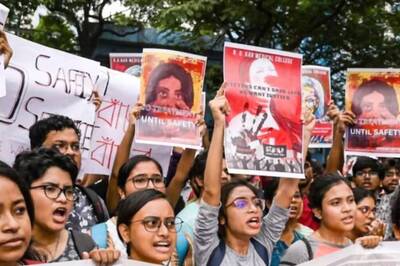
views
The second or third generation versions of Covid-19 variant known as B.1.617 may already be circulating in India and could be more dangerous, former Harvard Medical School professor William Haseltine has said.
“India has the necessary genome sequencing capabilities but it needs to have a mass surveillance program. I’ll be on the lookout for more and newer variants, given the opportunity the virus has had with such a massive outbreak,” Bloomberg quoted Haseltine as saying.
Prof Haseltine in his observations have pointed out that there are chances that the new variants of COVID-19 may be currently racing through India’s tightly-packed population of 1.4 billion people.
With a record 4,14,188 new coronavirus infections being reported in a day, India’s total tally of COVID-19 cases climbed to 2,14,91,598, while the active cases crossed the 36-lakh mark, according to the Union Health Ministry data updated on Friday. The death toll has increased to 2,34,083 with 3,915 fatalities being reported in a span of 24 hours, the data updated at 8 am showed.
Registering a steady increase, the active cases have increased to 36,45,164 comprising 16.96 per cent of the total infections, while the national COVID-19 recovery rate has dropped to 81.95 per cent.
With the fear across the world over the new Indian variant or B.1.617, countries like Singapore, UK and Tanzania have curbed travel to and from India. Australia has also banned its citizens from returning from India earlier, but it withdraws the order after much criticism.
Because of the presence of two changes in the virus’s genome, called E484Q and L452R, the India strain has been called a double mutant. As per research, these genome affect a portion of the spike protein which is the key to the virus entering cells.
Some researchers believe that Indian variant (B.1.617) is as transmissible as the UK variant (B.1.1.7) and may be 70 percent more transmissible than earlier versions of the virus.
WHO has classified it as the a variant of interest. However, initial studies have indicated that the Indian variant does not pose a big threat and doesn’t appear to be more dangerous.
Centre for Cellular and Molecular Biology’s (CCMB) Rakesh Mishra had said that two of India’s vaccine- Covaxin and Covishield, that is being administered nationwide, are effective against the strain.
Meanwhile, researchers are busy evaluating the data and findings of genomic surveillance which may help in providing crucial information on the new forms of this shape-shifting virus. This can even help in preventing subsequent waves and develop the next generation of vaccines.
WHO’s technical lead officer Maria Van Kerkhove had said that information about new variants is coming in ‘fast and furious’ as they are monitoring variants through a global working group of laboratories.
Read all the Latest News, Breaking News and Coronavirus News here. Follow us on Facebook, Twitter and Telegram.



















Comments
0 comment